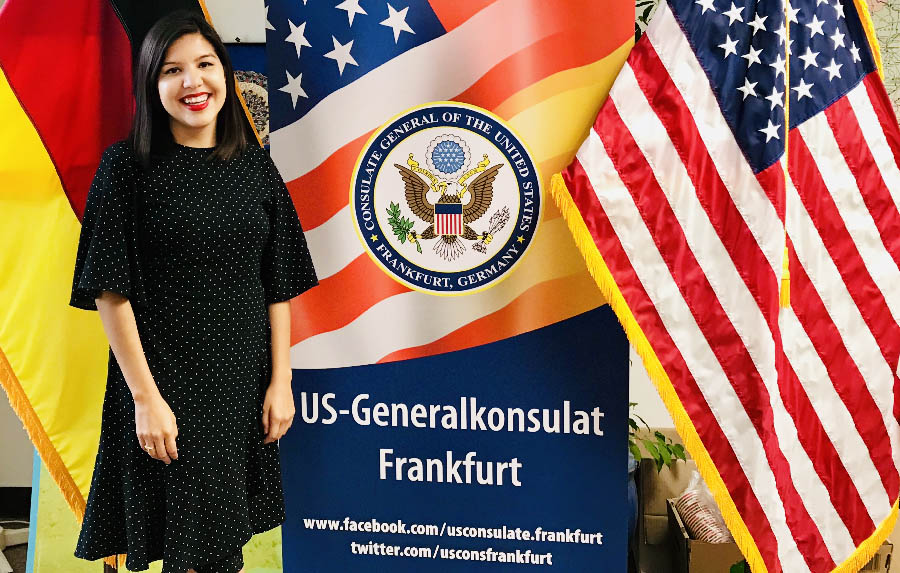
(Photo courtesy of Elisa Santana)
LBJ students check in from their summer internships focusing on global affairs, food security and hunger, wildlife conservation, municipal finance and U.S.–Mexico environmental issues.
- Abby Attia: Bread for the World Institute
- Rachel Brooks: MIRRA (Methods for Irrigation and Agriculture)
- Ricardo Correa: Travis County Planning and Budget Office
- Shelby Evans: Development in Gardening
- Brittany Horton: World Wildlife Fund
- Philip Jankoski: Texas Commission on Environmental Quality
- Salimah Jasani: Office of House Speaker Nancy Pelosi (D-CA)
- Elisa Santana: U.S. Department of State at the U.S. Consulate in Frankfurt, Germany
- Kat Sisler: The Chicago Council on Global Affairs
The mission of the LBJ School is to train both "thinkers and doers," and a hallmark of the LBJ experience is a curriculum that combines academic work with practical experience in the policy world. Students get a chance to customize not only their coursework but also their work experience via a required 400-hour professional internship related to their policy area of interest.
Every summer, LBJ School students head out into the policy arena to learn more about the kinds of careers they can pursue after graduation — and to gain the experience they'll need to begin. A few of them sent us some details about what they did this year, and what they learned in the process.
Abby Attia (Dual degree MGPS and Middle Eastern Studies): Bread for the World Institute
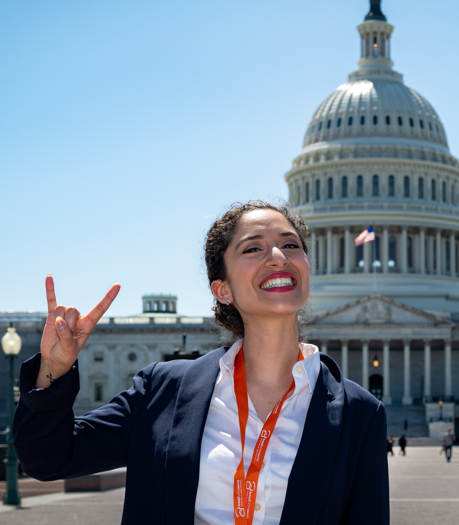
As a research fellow for Bread for the World Institute this summer, Abby Attia worked on the institute's Global Fragility initiative to inform members of Congress about issues of global fragility and hunger. Bread for the World Institute provides nonpartisan policy analysis on hunger and strategies to end it, educating opinion leaders, policymakers and the public about hunger in the United States and abroad since 1975. In addition to publishing the annual Hunger Report, the institute publishes analyses on current domestic and international issues surrounding ending hunger.
She worked closely with Bread for the World Institute Director Asma Lateef on writing three case studies on fragility, which are being formatted for publication as part of a series to inform policies in Congress. The case studies provided development-oriented narrative around fragility policies and updated the organization's messaging to align with current bills and policies.
"Food aid policy is the foundation for many of the U.S.'s projects overseas, and this internship helped me understand its importance to my future work. Connecting with passionate professionals in this field helped me understand the variety of career paths in this field and where I would best fit." — Abby Attia
She also published two blog posts in the monthly newsletter, attended briefings on international food aid, and meet with members of Congress and their staff to discuss U.S. foreign aid policies.
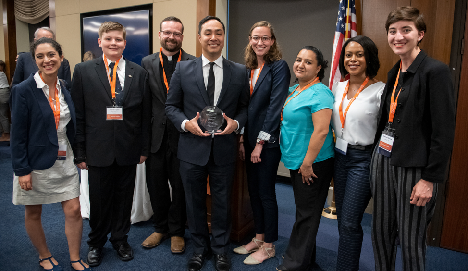
on Capitol Hill. (Photo courtesy of Abby Attia)
"My Policy Research Project with Dr. Kate Weaver introduced me to U.S. foreign aid policies on food aid," she said. "I learned about advocacy and research on this topic, and it deepened my understanding of this policy area. I went into the fellowship already understanding the different organizations and policy makers in the field.
"Food aid policy is the foundation for many of the U.S.'s projects overseas, and this internship helped me understand its importance to my future work. Connecting with passionate professionals in this field helped me understand the variety of career paths in this field and where I would best fit."
Rachel Brooks (Dual degree MGPS and Middle Eastern Studies): MIRRA (Methods for Irrigation and Agriculture)
As a research intern for MIRRA (Methods for Irrigation and Agriculture), a nonprofit in Jordan that works on irrigation, water management and agricultural practices throughout the country, Rachel Brooks spent a lot of her time working with Dr. Samer Talozi, the organization's director, on publications. She wrote and edited scientific papers, newsletters and grant proposals, and also conducted a training for staff on technical writing. A key component of MIRRA's mission is to provide technical knowledge to farmers and organizations regarding irrigation, agriculture and water with the intention of reducing the amount of water necessary to produce crops.
"This internship allowed me the opportunity to gain experience in water, climate change, and other environmental policy areas, all of which are extremely pressing issues in the Middle East."
— Rachel Brooks
Brooks used skills from her background in journalism to prepare articles for publication and submission, updating and compiling references for seven different scientific journals, including one she co-authored. Working with LBJ Professors Sheila Olmstead and David Eaton helped to give her a foundational understanding of climate change and water issues.
Currently, MIRRA's main programs focus on sanitation and wastewater treatment using solar energy in schools funded by UNICEF; increasing sustainable agricultural practices and water management in rural farms; and publications regarding water and climate change in Jordan.
"I visited the sites of MIRRA's projects to see the on-the-ground work that impacts local communities," Brooks said. The project with UNICEF is nearly complete and can be reproduced in other communities to ensure sanitation in schools, save costs through solar energy and improve water management by using treated wastewater for irrigation. MIRRA’s project in the Azraq basin is just beginning, and involves training youth and community engagement for best sustainable agricultural practices, as well as water management.
"This internship allowed me the opportunity to gain experience in water, climate change, and other environmental policy areas, all of which are extremely pressing issues in the Middle East," she continued. "I also was able to gain experience turning scientific research in to white papers and policy recommendations."
Ricardo Correa (Dual degree MPAff and Latin American Studies): Travis County Planning and Budget Office (PBO)
At the Travis County Planning and Budget Office, Ricardo Correa took part in multidisciplinary research with the potential to transform communities from the bottom up through municipal finance policy research and effective budgeting practices. He participated and engaged in public demonstration hearings at the Commissioner's Court and helped facilitate a live competitive bond sale with the County's investors and underwriters.
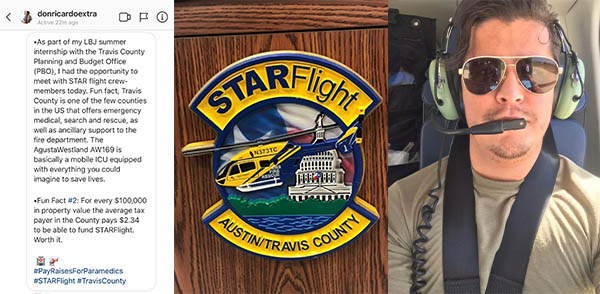
During the final weeks of his internship at PBO, he was tasked with drafting the Continuing Disclosure Policy, Rules and Procedures for the County, and was able to combine his knowledge of municipal finance with information gathered through public engagements, conversations with bond lawyers, public finance investment bankers, and meetings with the County’s municipal advisers. Diana Ramirez, Travis County's director of economic development, offered Correa the opportunity to extend his internship into the fall semester, to continue working with the county's Economic Development and Strategic Investments Department (EDSI).
Correa, a first-generation Latino dual-degree student, said Professor Gordon Abner's public management course and Professor Martin Luby's public financial management course gave him the essential groundwork to understand public policy issues in the public-private domain with respect to debt obligations and derivative instruments — as well as how public organizations work in tandem with civil society.
"The breadth of interdisciplinary scholarship (due to these two courses) complimented my graduate-level studies, honing my capacity to grapple and take the UT adage 'What Starts Here Changes the World' seriously beyond the confines of the academic lecture hall." — Ricardo Correa
Thanks to Abner's class, "my aptitude of how public organizations operate due to budgetary constraints and a whole hosts of exogenous issues was tremendously enhanced," he said. And Luby's course left him "better equipped to propel forward policy solutions through financial instruments at the local, state, and federal level."
"The breadth of interdisciplinary scholarship (due to these two courses) complimented my graduate-level studies, honing my capacity to grapple and take the UT adage 'What Starts Here Changes the World' seriously beyond the confines of the academic lecture hall," Correa said. "The enriching depth of PFM and PM combined with the specific training on public policy dilemmas Dr. Abner and Dr. Luby continually provoke are critical to enabling future students to acquire the necessary practical and conceptual toolset in and outside of government as we continue to strive toward reaching equitable social change."
Shelby Evans (MPAff): Development in Gardening
As a communication officer for Development in Gardening (DIG) in rural Uganda, Crook Fellow Shelby Evans focused on storytelling — creating a variety of materials and capacities to help the organization make a greater impact. DIG's mission is to enact projects that enable vulnerable and HIV-affected communities to meet their own needs and improve their well-being through nutrition-sensitive and sustainable agriculture. The organization uses a grassroots, community-driven, culturally responsive approach to co-create programs that influence local policy and ensure the longevity of development achievements.
"I felt honored and proud to have the opportunity to hear about the lives of the program participants and how their work with the facilitators has brought about tangible changes in their lives and communities." — Shelby Evans
Evans created training materials to help staff collect stories and write field reports; trained them in collecting qualitative data; developed a catalog of success stories; wrote staff profiles and in-depth interviews for the website; led team building workshops; supported a donor visit; tracked the field budget; collected participant stories across more than a dozen communities; and worked on write-ups related to program outcomes.
"The most unexpected part of my work was the effort it took to collect data, because the communities DIG works with are very isolated," she said. "I felt honored and proud to have the opportunity to hear about the lives of the program participants and how their work with the facilitators has brought about tangible changes in their lives and communities."
The DIG program is moving into some new communities in Uganda and will check in on communities where the program has completed, Evans noted. "Every farmer I spoke with has a family that is now food secure and a great number of the participants have seen improvements in their health and economic livelihoods."
"My experience at the LBJ School helped me to understand how the combined efforts of community engagement, securing project funding, developing programs, designing a feedback and feedback implementation process, data collection, and presenting work to the public are all necessary for project success," she said. "This experience has informed what I feel I am capable of and interested in doing post-graduation."
Brittany Horton (MGPS): World Wildlife Fund
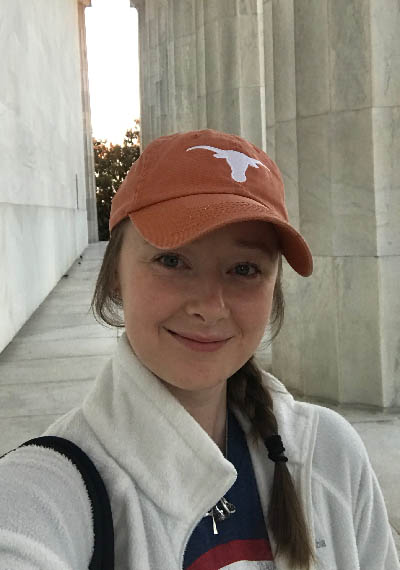
As the Data for Nature intern within World Wildlife Fund's Global Science team, Brittany Horton contributed to two major projects: Data Gaps and the Conservation Dashboard.
For the Data Gaps project, she evaluated the recent IPBES Global Assessment Report, which essentially stated that biodiversity and the conservation field are facing an uphill battle in the years to come. She reviewed drivers of biodiversity loss and identified gaps in our knowledge of how to measure biodiversity and set effective targets for conservation action.
The Conservation Dashboard gave Horton an opportunity to do some data sleuthing and learn more about the WWF's wide range of initiatives. The Dashboard, she explained, is a one-page visual status update on the key goals and initiatives in the organization's nine practices, or focus areas, giving decision-makers an overall view of the WWF's goals. She worked with stakeholders from multiple areas, particularly Wildlife and Food, to translate goals into measurable indicators.
"Operating within the intersection between conservation and people is central to the work being done at WWF, and I know that LBJ prepared me for this work, which will hopefully springboard into a career in the conservation field." — Brittany Horton
"For both projects, my scope was 'all of nature and nature's contributions to people,' so I was constantly thinking about biodiversity and conservation issues on a global scale," Horton said. "Although the work that I was doing was initially more data-focused, I was able to take lessons I've learned at LBJ about decision-making, allocating limited resources, and working through complex problems and apply them to the work at WWF.
"Also, as a MGPS student, the global perspective I've gained through my coursework at LBJ was invaluable to me," she continued. "Operating within the intersection between conservation and people is central to the work being done at WWF, including in the two projects I work on, and I know that LBJ prepared me for this work, which will hopefully springboard into a career in the conservation field."
By working in the Washington, DC office, Horton was able to collaborate and connect with individuals across disciplines, and she was able to network with individuals who are steeped every day in the work that she wants to do, namely conservation, illegal wildlife trafficking and human-wildlife conflict.
"The time I got to spend having lunch or coffee meetings with professionals in my field of choice was indispensable," she said. "This was an experience I will remember for a long time, but I am so excited to get back to LBJ for my second year!"
Philip Jankoski (MPAff): Texas Commission on Environmental Quality
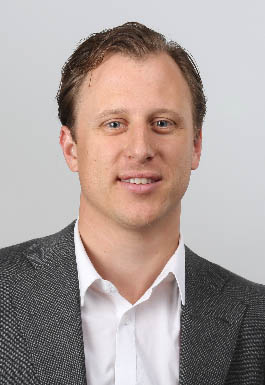
This summer, Philip Jankoski worked with the Border Affairs office, part of the Intergovernmental Relations department at the Texas Commission on Environmental Quality, which reports directly to the governor's office on U.S.-Mexico environmental issues.
As part of his projects, he traveled to the Rio Grande Valley to promote an innovative financial tool, the Property Assessed Clean Energy (PACE) program, to private and public stakeholders.
"Essentially, I completed another PRP with real-world implications for TCEQ. I utilized my background in design thinking, strategic visioning and communications to process existing agency operations and make recommendations for key improvements. The end product contains key information which otherwise would not have been collected and synthesized." — Philip Jankoski
Jankoski also helped conduct an internal audit of the Border Initiative and Border 2020 program, incorporating the UN Sustainable Development Goals as a framework for binational cooperation, benchmarking and impact measurement. He developed an internal white paper report with key findings and recommendations for building on the binational efforts, which, he said, is likely to be sent to TCEQ Executive Director Toby Baker and TCEQ Commissioner Emily Lindley.
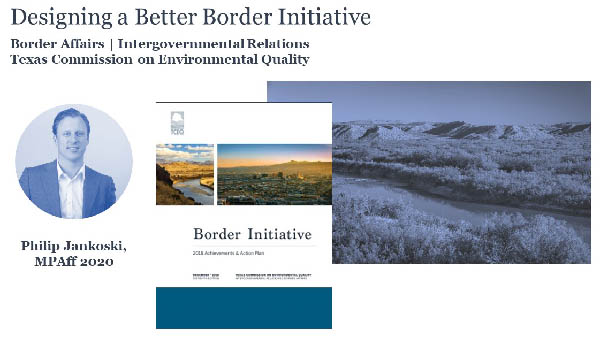
His work helped built the internal capacity of TCEQ Border Affairs to incorporate new strategies for their core programs and initiatives, Jankoski said. "The timing was ripe as I worked during a positive leadership transition and the staff was interested in innovative ideas to improve mission delivery of protecting the environment on the U.S.-Mexico border."
The PRP process at the LBJ school definitely prepared him for the job, Jankoski said. "Essentially, I completed another PRP with real-world implications for TCEQ. I utilized my background in design thinking, strategic visioning and communications to process existing agency operations and make recommendations for key improvements. The end product is a visually attractive and content-rich policy recommendation that contains key information which otherwise would not have been collected and synthesized."
Salimah Jasani (MPAff–DC): Office of House Speaker Nancy Pelosi (D-CA)
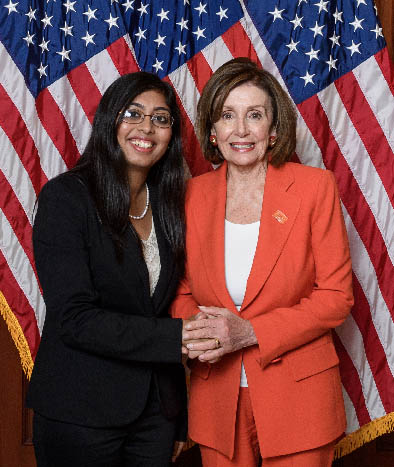
Salimah Jasani is undertaking her policy apprenticeship at the Office of the Speaker of the U.S. House of Representatives as a fellow working under Patti Ross, Speaker Nancy Pelosi's senior policy adviser for education, labor, agriculture and veterans' issues. She attends meetings with stakeholders, drafts policy memos, conducts policy research and tracks important legislation and regulations in Ross's areas.
"I'm especially proud to have conducted research in advance of House passage of the Raise the Wage Act, which gradually raises the federal minimum wage to $15 an hour and eliminates the subminimum wage for people with disabilities, tipped workers and newly employed workers under the age of 20," she said. "I helped to study the impact of a minimum wage increase on specific demographic groups, which was used to dispel widely held myths around the $15 minimum wage.
"In some ways, it can be difficult to measure the impact of working as a fellow/apprentice on Capitol Hill, because the legislative process takes a long time to come to fruition! On the other hand, once a bill becomes law, there is a massive impact on the entire country." — Salimah Jasani
"In some ways, it can be difficult to measure the impact of working as a fellow/apprentice on Capitol Hill, because the legislative process takes a long time to come to fruition!" she continued. "On the other hand, once a bill becomes law, there is a massive impact on the entire country. I've also become interested in the DC local education community and am hoping to use the next few months of my policy apprenticeship to get more involved in some of the grassroots work happening here around increasing educational equity."
Many of her LBJ classes prepared her for the apprenticeship, citing specifically Professor Ruth Wasem's legislative development class, which has helped as she skims through massive pieces of legislation and cross-references it with public law to find important information. She also said her DC-specific classes — Professor Elizabeth Rybicki's How the U.S. Congress Works and Professors Scott Lilly and Dan Chenok's Federal Budgeting — have been integral to her work on the Hill. In addition, Jasani noted, LBJ's emphasis on data analysis, succinct writing and critical thinking are helpful nearly every day.
Elisa Santana (MGPS): U.S. Department of State at the U.S. Consulate in Frankfurt, Germany
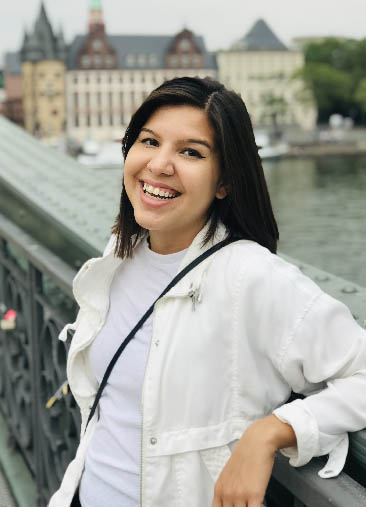
A second-year student pursuing her Master of Global Policy Studies, Elisa Santana interned this summer in the State Department's Political and Economic Affairs section at the U.S. Consulate General in Frankfurt, Germany through the Clements Center's Student Professional Development Fund. There she wrote a speech for the consul general, worked on the Human Rights Report for Germany, presented to German graduate students and helped provide logistics for a conference.
"The U.S. Consulate in Frankfurt is unique place," she said. "It's one of the largest diplomatic missions in the world, also hosting 10 separate U.S. government agencies and over 1,000 employees. I not only had the opportunity to work in my section, but to learn about and work with different sections and agencies.
"My supervisors and colleagues treated me with respect. They encouraged me to take on large responsibilities and provided a space for real professional development. ... I can't speak enough on how prepared I felt going into this internship." — Elisa Santana
Economically, the Frankfurt region is extremely important, Santana said, because it hosts the headquarters of the European Central Bank and many major German companies. At the consulate she had the opportunity to use her knowledge of German businesses and politics through research, memos and presenting on behalf of her section.
"Most importantly, my supervisors and colleagues at the U.S. Consulate in Frankfurt treated me with respect," she said. "They encouraged me to take on large responsibilities and provided a space for real professional development."
"I can't speak enough on how prepared I felt going into this internship. From taking a core course with Executive Director Will Inboden to the Clements Center's portfolio program, I was provided with the knowledge needed for a career at the State Department."
Kat Sisler (Dual degree — MPAff and public health): The Chicago Council on Global Affairs
Crook Fellow Kat Sisler spent her summer in Washington, DC as a governmental relations intern in the Global Food and Agriculture program of the Chicago Council on Global Affairs, an independent, nonpartisan organization that provides insight on critical global issues. As part of a three-person team in Washington, she gained a broad range of experience, researching public and private investments in agricultural research and development, the impact of U.S.–China trade on American farmers, and the effects of climate change in West Africa. She also wrote briefs on legislation, reported on hearings related to agriculture, trade and international development and represented the Council at InterAction meetings and Capitol Hill events.
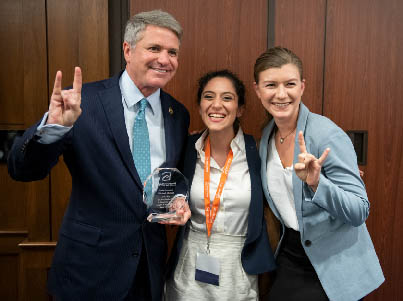
and Kat Sisler (right) on Capitol Hill.
"Beginning the dual-degree, I knew at some point I wanted to spend time in DC — as a policy student, it only made sense to try to spend time in the hub of policy creation," Sisler said. "This internship gave me a better idea of what to expect from policymaking at the federal and global level, especially as it relates to food and agriculture. I also gained experience in strategic communication, and how to make an issue like hunger, which is always present, relevant amidst competing interests and constant news.
"This internship gave me a better idea of what to expect from policymaking at the federal and global level, especially as it relates to food and agriculture. I also gained experience in strategic communication, and how to make an issue like hunger, which is always present, relevant amidst competing interests and constant news." — Kat Sisler
"I've learned that I enjoyed doing governmental relations and strategic communications, and would like to take that to work more on the advocacy or programming side. I was fortunate to have many opportunities to network and meet with advocates in the hunger and health community."
Sisler said she felt very well prepared for this internship. Through Professor Kate Weaver's PRP, she gained background in hunger advocacy and how the issue is being addressed both in the U.S. and abroad, including those in Congress who champion the fight against hunger in Congress. She noted that Professor Martin Luby's public financial management gave her a deeper understanding of the appropriation process and budgeting, and that Professor Erin Lentz's international development course provided a timeline of what development has looked like over the years, and was useful in a variety of ways.

